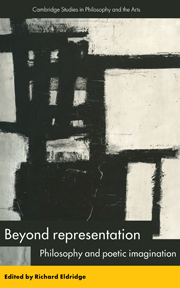Book contents
- Frontmatter
- Contents
- List of contributors
- Editor's acknowledgments
- 1 Introduction: from representation to poiesis
- 2 Confession and forgiveness: Hegel's poetics of action
- 3 The values of articulation: aesthetics after the aesthetic ideology
- 4 In their own voice: philosophical writing and actual experience
- 5 Poetry and truth-conditions
- 6 Fractal contours: chaos and system in the Romantic fragment
- 7 The mind's horizon
- 8 Kant, Hölderlin, and the experience of longing
- 9 Wordsworth and the reception of poetry
- 10 Self-consciousness, social guilt, and Romantic poetry: Coleridge's Ancient Mariner and Wordsworth's Old Pedlar
- 11 Her blood and his mirror: Mary Coleridge, Luce Irigaray, and the female self
- 12 Scene: an exchange of letters
- Index
5 - Poetry and truth-conditions
Published online by Cambridge University Press: 06 July 2010
- Frontmatter
- Contents
- List of contributors
- Editor's acknowledgments
- 1 Introduction: from representation to poiesis
- 2 Confession and forgiveness: Hegel's poetics of action
- 3 The values of articulation: aesthetics after the aesthetic ideology
- 4 In their own voice: philosophical writing and actual experience
- 5 Poetry and truth-conditions
- 6 Fractal contours: chaos and system in the Romantic fragment
- 7 The mind's horizon
- 8 Kant, Hölderlin, and the experience of longing
- 9 Wordsworth and the reception of poetry
- 10 Self-consciousness, social guilt, and Romantic poetry: Coleridge's Ancient Mariner and Wordsworth's Old Pedlar
- 11 Her blood and his mirror: Mary Coleridge, Luce Irigaray, and the female self
- 12 Scene: an exchange of letters
- Index
Summary
Paul Celan writes, in “Tübingen, Jänner”: “Should, should a man, should a man come into the world, today, with the shining beard of the patriarchs: he could, if he spoke of this time, he could only babble and babble, over, over, againagain.” I am inclined to call this utterance true. What do I mean by this? Do I mean anything like what I mean when I call Einstein's theory of relativity true?
Talk of truth in poetry is liable to upset both philosophers and literary theorists. Literary theorists often feel that to ask whether a poem is “true” or not is seriously to miss its point – that poems are about much more than truth, that literature is not bounded by the question, “But is it true?” Philosophers are wary, on the other hand, of the notions of truth that poets are liable to come up with. Valery suggests that poetry breaks us of our ordinary use of language so we can “confront things as they really are, unmediated as far as possible by the veil of language.” One does not have to have done much philosophical thinking about language and concepts to find this notion of a primordial, immediate contact with the things of the world incoherent.
Yet we do say, “that's true,” or, “there's a deep truth to that,” about lines in poetry; we praise certain poets for their honesty or insight; and we say we have learned from poems and poetic utterances. So what is the relationship between truth in poetry and truth in science?
- Type
- Chapter
- Information
- Beyond RepresentationPhilosophy and Poetic Imagination, pp. 107 - 132Publisher: Cambridge University PressPrint publication year: 1996
- 2
- Cited by



